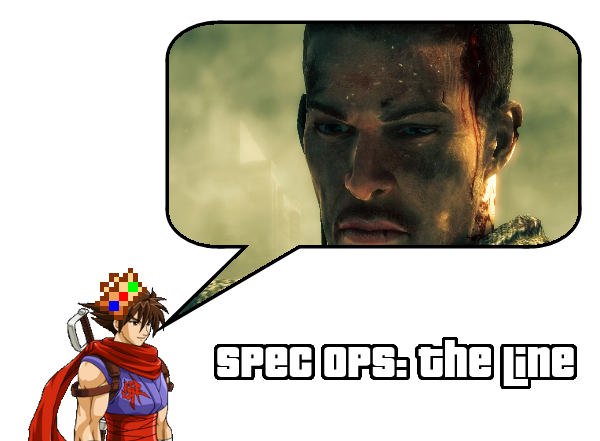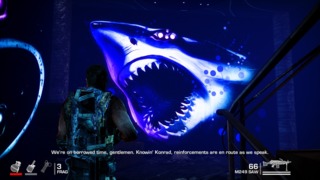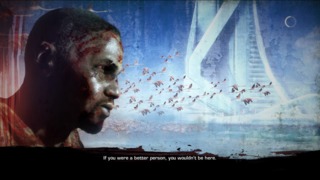Spec Ops: Grandpa's Leftovers.
By Video_Game_King 33 Comments


Well, isn't this a stark contrast from my last blog? Not just in the title (in that you could probably guess what I'm going to talk about this week), but also in the games I'm covering. Remember how Valkyria Chronicles and Medal of Honor both treated war with irreverence, and they both suffered because of that? Spec Ops: The Line ain't having any of that shit. This game absolutely knows how to put the medium to use, and in this case, that use is to create some horrifying imagery of war. And damn, does it do a good job.
It all begins when a small group of soldiers get sent into Dubai. Their mission is simple enough: pick up survivors and find out what happened to the 33rd Infantry. This all changes about three chapters in. The once opulent city of Dubai has fallen into a state of utter decay, teetering on the edge of nothingness; the 33rd are revealed to be a bunch of assholes (not that you're much better); and overall, things just become weird. Really, really weird. Thus we arrive at perhaps the game's greatest strength: it's surreal nature. Sometimes, this backfires horribly, like it does with this silly shit. Fortunately, that's only a minor fraction of the experience. The rest of the time, it works beautifully. You'd think blurring the lines between fantasy and reality would make the terrors of war harder to take seriously, but the opposite happens. That otherworldly atmosphere permeating the streets of Dubai only makes the atrocities pop out more. You directly experience the toll that war takes on those experiencing it. Better still, the game never lets up. From beginning to end (whatever those are; they blend together), the game simply becomes more hideous and twisted and repulsive, like a mocking parody of itself.

And then there are the choices. They...are actually where the game starts to fall apart. I get what the game's trying to do, although that may have something to do with its lack of subtlety. Anyway, I get it: I shouldn't try to shirk off responsibility for the things I do. Everybody's constantly pinning the blame on somebody else, or placing their deeds into a better context. That last one might hold validity, but does the first one? Do I have any real ability to avoid the terrible actions in this game? Most of the scenarios presented me with three options: "Horrible Atrocity A", "Horrible Atrocity B", and "Fuck Else". You can say "just walk away" all you like, but it doesn't mean much unless I actually have the ability to walk away. I can remember quite a few situations where I tried simply walking away from something terrible, only for Spec Ops to railroad me into an awful "choice". It's not entirely fair or thought out to blame me for choices I was essentially forced into. But then that ending comes around, and man, does it fix every flaw these themes could possibly have. I know that sounds exceedingly hyperbolic, especially when I'm not going to tell you what the ending's like (spoilers), but you're just gonna have to trust me on this. It really is that good.
The only real flaw I'd see with the game is how it uses cutscenes. If not for them, I'd probably hold the game in higher regard than I already do. At times, it's almost like the game is a movie. I mean, yea, the moments when you're playing are just as important to the story (the most horrifying moments are usually the ones you directly experience), but come cutscene time, and Spec Ops feels like a completely different experience. There's staging, an acute focus on camera work, and all these other things that never happen when you're actually fighting your way through Dubai. Again, it's like a movie, which is the worst possible thing this game could be, given its message. If I feel like I'm simply watching events unfold before me (rather than like I'm actually making these events happen), I'm going to feel some distance from what's happening. Now I can safely abdicate responsibility for what I did in the game, because I didn't do it; I just watched some guy do all these horrible things. Hell, I'm only a special guest in this game. How can themes like "you always had a choice" or "you're not a hero" apply to me under those conditions, game?

Oh, that reminds me: this is a video game we're talking about. It's a shooter, which should mean you shoot bad guys until the game gives you other bad guys to shoot, and for a time, that's true. In fact, the only distinguishing trait early on is just how often you're shooting out windows to let sand rain down on your foes. But this is Spec Ops we're talking about, so of course, it's going to put a scary amount of thought into this one aspect of the game. You want to feel like you're in a hell on Earth? It doesn't matter; Spec Ops is gonna do it, anyway. You're constantly running out of ammo, bullets are so lethal that even hearing them can put you in a comatose state, and you need to issue orders to your allies intelligently if you want to succeed in a firefight. That last one might sound rather tame until you realize that about half the game is spent away from those teammates. So yea, just about every shoot-out is tense, frantic, chaotic, and a bunch of other words you'd use to describe a war zone. Overall, a fitting complement to everything else in the game.
(There are also BioShock-esque intelligence tapes to pick up every now and then. The less said about these jarring little boxes, the better.)
Actually, now that I think about it, that's a weird way to refer to Spec Ops: The Line. After all, you're not coming to this because of the shooting mechanics or anything like that. (Just ignore the multiplayer mode on the title screen. The developers certainly have.) You're coming to this game because it knows how to connect to you. And promptly stomp the ever-loving hell out of your conceptions of the world. You're coming for the haunting imagery and that feeling that things are slowly spiraling out of control, eventually reaching a crescendo of absolute carnage. It is a beautiful madness.
Review Synopsis
- Who knew that the Middle East could be such a horrible experience?
- How the game handles choice looks pretty bad at first. Then you hit the credits, and it looks pretty good.
- Oh, and you shoot things, I guess. That's in there.
- You know, I probably could've just said "Apocalypse Now: The Game", and you'd understand most of the review.
You know, this is an oddly accurate summary of Spec Ops: The Line.

This was supposed to be DEFCON. You know, so I could pair it with Spec Ops thematically. Unfortunately, several factors got in the way of that, like it being a multiplayer game and my absolute lack of skill in it. So instead, we're looking at Tiny and Big, the Turner & Hooch of video games. Probably. If ever there was a poster child for simplicity in game design, Tiny and Big would be it. The game really only has one gameplay element to fuck about with, but does that stop it from being good? Hell no! If anything, that only makes the game better, since the game can now focus on milking the hell out of this one particular mechanic.
That feature, of course, is cutting shit up. What? You couldn't gather that from the title? Grandpa's Leftovers are ropes, fire, and cutting implements. (Actually, the leftovers are underwear, but is that really any less unsettling?) You're gonna have to use every last one of them to navigate all those acrophobia inducing environments. Now, that may not sound like fun, but that's only because I haven't mentioned the very loose physics on display. This is where things get interesting. When you combine loose physics with tools that let you manipulate your environment, you transform the world into your personal playground. A sense of childlike glee will roll over your face as soon as you realize that the world only exists so that you can utterly destroy it. By that, of course, I mean you're going to feel both very, very powerful, and very, very stupid. Hell, there's even a small sense of rebellion as you defy the game's implicit orders. Yes, there's clearly a right way to get through these levels, but who gives a shit when the wrong way is clearly much more enjoyable?

Eventually, though, you're gonna have to do things the right way. As fun as it is to slice a level into ribbons, it's also a very good way to screw yourself out of any progress. You're gonna have to slow down considerably if you want to make your way through the game. Surprisingly, this only makes the game that much better. Instead of merely giving you some monuments to needlessly cut up, Tiny and Big's now testing a set of skills, and it does so relatively well. Success in the game hinges on paying careful attention to you environment and knowing all the ins and outs of your various tools. Watching it all come together leaves you with a well deserved sense of accomplishment. Hell, I'd go so far as to say that the sense of chaos from before only enhances that feeling of accomplishment. After all, you're gonna feel a lot better for solving something if you know just how badly you screwed things up beforehand. Of course, this set-up isn't entirely perfect. The frequent checkpointing robs you of at least some sense of accomplishment, and the loose physics that were so fun a while ago now introduce an unwanted element of luck into the mix. But despite these issues, the game manages to have its cake and eat it, too. Oh, and there are rocks to collect, too, and maybe a couple of other extras, but the game calls those boring, anyway, so I see no harm in skipping them over completely.
Speaking of things I'd rather ignore: the length. The game's a measly couple of hours long, and I feel like I'm left wanting more. Not because two hours is too short for a game, but because it's too short for this game. For all the game does with the idea of cutting things, I still feel like it could do more. Not much, mind you, but the game still ends just before it's exhausted every last opportunity to slice things apart like a madman. It's like the game is underdelivering on its own potential, even if it's only doing so by a marginal amount. Fortunately, though, that's not really enough to drag down the game's other accomplishments. I mean, it still somehow manages to take an idea that's completely dumb and transform it into something that's thought out. How many games can claim to do that? Without being designed by Hideo Kojima?
Review Synopsis
- This must be what it's like as a five year old.
- With the brain of a thirty five year old.
- Just keep in mind that it's only a couple hours long.
- Wait, I think I just described Akira. So yea, Tiny and Big is exactly like Akira.